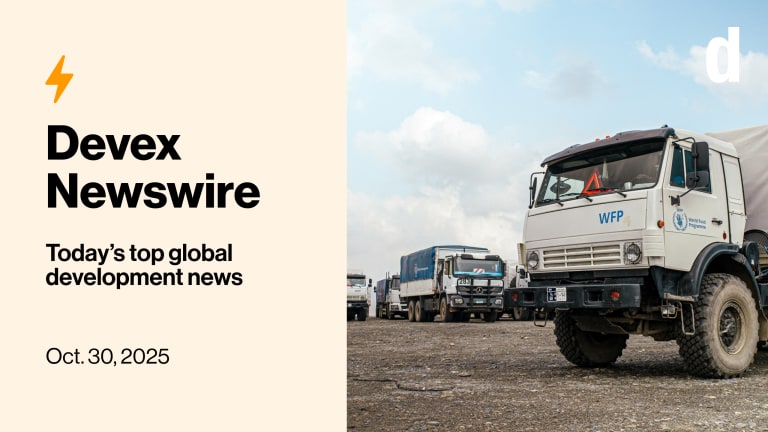
The world is bracing for further conflict in Ukraine after Russian President Vladimir Putin recognized the independence of Luhansk and Donetsk Monday and ordered Russian forces into the self-proclaimed republics.
Wondering what the foreign aid picture in Ukraine is like? We’ve put together an overview for Devex Pro subscribers of where assistance has been going in recent years.
This is a preview of Newswire
Sign up to this newsletter for an inside look at the biggest stories in global development, in your inbox daily.
Development funds nearly doubled from $675.5 million in 2011 to $1.3 billion in 2019. For humanitarian aid, since the beginning of the crisis in 2014, the United Nations and its partners have provided more than $1.2 billion for relief and protection.
Get the full breakdown from Miguel Antonio Tamonan and our data team here.
Devex Pro: The state of humanitarian aid in Ukraine
+ You can use this tracker for live updates on commitments to the Ukraine Humanitarian Response Plan 2022, which calls for $190 million.
USAID Administrator Samantha Power met with Ukrainian-Americans Monday, according to a press release, “to share information about the range of contingency planning USAID and the U.S. government are undertaking to prepare for a potential humanitarian response in the event of a further Russian invasion of Ukraine.”
ICYMI: My colleague Will Worley looked into how aid organizations in Ukraine are adapting to the tense situation on the ground.
Gone too soon
Dr. Paul Farmer, a “giant” of global health, passed away Monday in his sleep in Rwanda at the age of 62. Tributes flowed from colleagues, development leaders, current and former presidents, and movie stars for the man who started a clinic in Haiti as a medical student, before going on to found Partners in Health, which has raised millions of dollars for community health facilities.
In 2014, Farmer gave an interview to Devex, telling my colleague Michael Igoe that the development community is “asking for … resources and misdirecting them” and calling for a focus on local capacity that echoes today’s push for localization.
“He led so many efforts for #healthequity & against root causes of injustices,” tweeted WHO Director-General Tedros Adhanom Ghebreyesus. “We must never stop continuing his legacy.”
The LEGO Foundation’s next big play is in …
Early childhood education. Devex Business Editor David Ainsworth speaks with CEO Anne-Birgitte Albrectsen to find out more.
There is around 900 million Danish krone on offer overall — roughly $140 million. That includes two grants worth 100 million Danish krone, three worth 200 million krone and 10 worth 6.5 million.
What LEGO is looking for:
• Projects that support children whose development has been hampered by the pandemic and demonstrate the importance of early years development, which it says has previously been “grossly underfunded.”
• Partners with a proven track record on ideas that can be delivered at scale.
• Ideas likely to attract other donors and investors to come in and add funding.
• Innovation on topics ranging from education, nutrition, family well-being, and reduction in home violence.
Devex Pro: Why the LEGO Foundation has launched its largest ever grant
+ Start your 15-day free trial to access all our Pro coverage — and catch up on more philanthropy news.
Green for green
Recent data finds that less than 2% of global philanthropy funding has gone toward mitigating climate change. Now, ClimateWorks Foundation President and CEO Helen Mountford tells my colleague Stephanie Beasley that she’d like to see the nonprofit usher in more philanthropic funding in that area.
“To me, philanthropy is really exciting because it is a space where you can actually use funds really strategically to complement or to fill gaps or to really sort of innovate and move things forward, which aren't gonna happen in the private sector or the public sector,” Mountford explains.
ClimateWorks chief: It's time to start fulfilling COP 26 pledges
Facing the music
“It’s always more comfortable to talk about other people’s problems than your own. But if we don’t deal with this issue at home, we can’t present the right face to the world.”
— Paul Weisenfeld, executive vice president for international development, RTI internationalWeisenfeld is one of the core team at CREED, the Coalition for Racial and Ethnic Equity in Development, which is launching a pledge today and encouraging other development organizations to sign on to make trackable commitments “to build racial and ethnic equity” within their organizations.
Read: US aid organizations invited to commit to racial equity pledge
Stay tuned: Devex President and Editor-in-Chief Raj Kumar is moderating CREED’s launch event today, starting at 1:00 p.m. ET (7 p.m. CET). You can catch that here.
In other news
U.S. embassy staff have once again relocated, this time from Lviv in western Ukraine to Poland, as tensions continue to mount between Russia and Ukraine. [New York Times]
John Kerry, U.S. climate envoy, joined Egyptian officials Monday during the launch of a working group tasked with preparations for this year's U.N. climate change conference, to be held in Sharm el-Sheikh. [AP]
The U.K. will slash its contribution by 54%, from almost £3 billion ($4.1 billion) to £1.5 billion, to a World Bank program aimed at helping low-income countries recover from the pandemic. [The Times]
Correction: Yesterday’s exclusive on COVAX’s Humanitarian Buffer vaccine delivery to Thailand being canceled was coauthored by Rebecca Root and Jenny Lei Ravelo.
Sign up to Newswire for an inside look at the biggest stories in global development.








